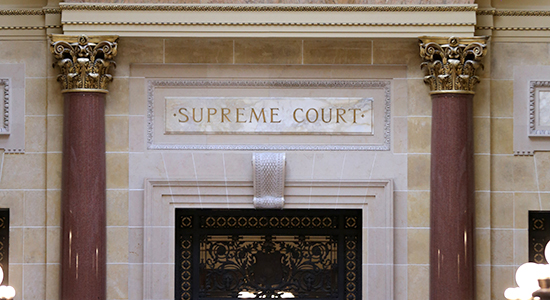
Feb. 22, 2017 – Sentencing courts can consider the facts underlying a previously expunged record in making sentencing decisions, the Wisconsin Supreme Court has ruled, rejecting the claim that factual information underlying an expunged record is off limits.
Christopher Allen entered no contest pleas for homicide by intoxicated use of a vehicle and injury by intoxicated use of a vehicle after he hit a tree while driving drunk at almost 100 miles per hour. One passenger was killed and another severely injured.
In exchange for his no contest pleas, the state dismissed three charges. The prosecutor agreed to recommend four years of initial confinement and made no recommendation on extended supervision. A presentence investigation (PSI) report noted that Allen was previously convicted for substantial battery, but the conviction had been expunged.
At sentencing, the prosecutor mentioned the substantial battery that was expunged and Allen’s defense attorney did not object to the prosecutor’s comment. Ultimately, the judge imposed a five-year prison sentence, with four years of extended supervision.
During the sentencing, the judge expressed concern that Allen failed to learn from his prior contact with the criminal justice system. Allen’s postconviction motion requested a new sentencing. He argued that the judge improperly considered the expunged record.
Allen’s postconviction counsel also argued that Allen’s defense was ineffective for failing to object to the PSI report, which referenced the expunged conviction and noted that Allen successfully completed supervision on that conviction, as well as the prosecutor’s comments. The circuit court denied the motion, and a state appeals court later affirmed.
In State v. Allen, 2017 WI 7 (Feb. 9, 2017), the supreme court unanimously affirmed the appeals court decision, concluding “that the sentencing court did not erroneously exercise its discretion when it considered the fact that Allen had previously successfully completed supervision in a case where the record of conviction had been expunged.”
The court noted a previous decision, State v. Leitner, which held that sentencing courts can consider facts underlying a prior crime, even if the resulting conviction is expunged.
In addition, the Leitner decision allows courts to consider the facts underlying the expunged record – such as successful completion of supervision -- “provided those facts are not obtained from expunged court records,” the majority opinion states.
References to Allen’s expunged record in the PSI report “were obtained from sources other than expunged court records” and thus allowed under Leitner, the court ruled. The PSI uncovered the information through a Crime Identification Bureau (CIB) / Federal Bureau of Investigation (FBI) Criminal Background report, not the expunged record.
“Given that any objections to these references would have been meritless, we determine that Allen’s trial counsel did not perform deficiently and was not ineffective,” Justice A.W. Bradley wrote in the majority opinion.
The court rejected Allen’s argument that Leitner is limited to facts underlying the crime for which expungement was granted, not the facts underlying the expunged record.
He also argued unsuccessfully that facts underlying the crime resulting in expungement can only be considered if interrelated to the facts underlying the current offense.
“[A] defendant’s behavior on supervision is relevant to a sentencing court’s consideration of his future behavior and overall character,” wrote Justice A.W. Bradley.
“Leitner does not require interrelated facts between the crime underlying a prior expunged record of conviction and the facts underlying a current criminal conviction.”
Concurring Opinion
Justice Shirley Abrahamson wrote a short concurrence. She joined the majority opinion but noted that it is “an extension of Leitner.”
Citing Leitner, Justice Abrahamson said the legislature’s goal is to “provide a break to young offenders who demonstrate the ability to comply with the law.”
“I am concerned that the court’s permitting more extensive use of the facts underlying the expunged record of conviction chips away at the purpose of expunction,” she wrote.
